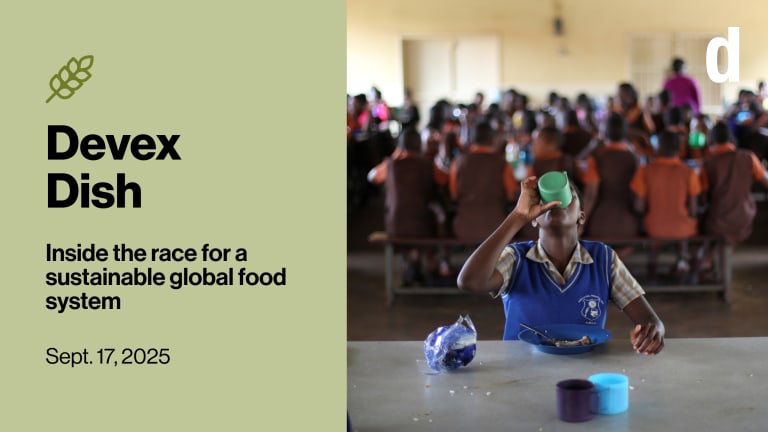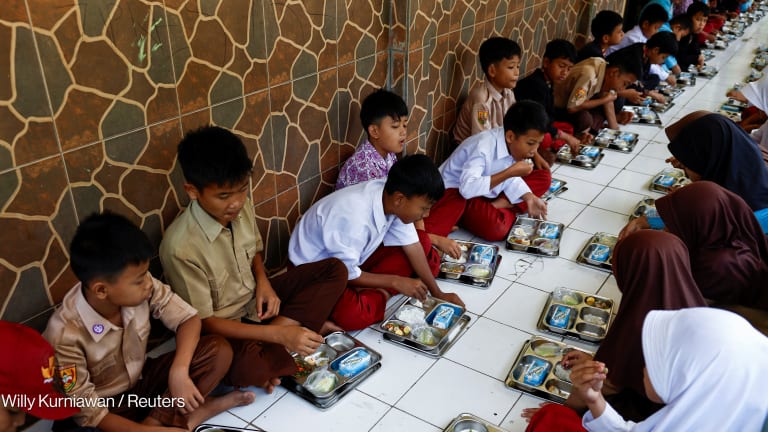
One of the most effective ways to solve global hunger is also one of the simplest: a school meal.
By providing a nourishing meal to students in need, the United Nations World Food Program offers children the nutrition they need to concentrate in the classroom and the vitamins and minerals they need to become healthy adults.
Each year, WFP reaches more than 18 million children in 60 countries with its signature red cup full of nourishing food. It’s as simple as that. And at the cost of 25 cents each, school meals are one of the most affordable ways to break the cycle of poverty and hunger.
See more #FeedingDev articles:
• The case for food fortification
• Beyond access to nutritious food: Why behavior change should be a priority for donors
• 1,000 Days: Why improving nutrition leads to long-term economic growth
• It is high time India stands up for its malnourished children
But food alone is not enough. From the private sector to national governments to other nongovernmental organizations in the field, WFP relies on a broad set of partnerships to ensure the success of its school meals program.
Here are five lessons we’ve learned:
1. School meals are only as effective as the classrooms in which they’re served.
In developing countries like Nepal, many children are forced to learn without desks, chairs, or even walls and a roof to protect them from the elements. Before the construction of a new building in 2012, pupils in the village of Sunkuda used to study on the dusty ground under an open sky. “When there was rain or too much sun, they would simply run away,” said Yagya Raj Joshi, the school’s headmaster.
In Syria, UNICEF estimates that one out of every five schools has been destroyed, damaged or converted into shelters for displaced families. Even when classrooms are available, too many students around the world lack access to the most basic materials — from pencils and paper to books and uniforms. Often, there aren’t enough skilled teachers to go around.
That’s why WFP relies on the support of business leaders such as construction giant Caterpillar to build better schools, and humanitarian partners like UNICEF to provide supplies and training for teachers. In Sunkuda, the German development agency GIZ provided technical expertise to design and erect the new school. National governments are also doing their part. In 2011, for instance, the government of Japan donated nearly one million textbooks to schools across Haiti.
2. Malnutrition is not just caused by a lack of food, but by poor sanitation and hygiene.
A sick child cannot properly absorb and retain nutrients. So in addition to providing school meals, WFP also offers crucial health and sanitation supplies, including de-worming tablets to treat parasitic diseases. In countries like Afghanistan, for example, it’s not uncommon for a child to carry as many as 1,000 hookworms, roundworms or whipworms that deplete blood and nutrients and weaken the body’s ability to absorb certain carbohydrates, proteins and vitamins like Vitamin A.
WFP also provides education on good hygiene and sanitation practices to prevent the spread of infectious disease in the classroom.
3. Homegrown school meals can improve entire communities, not just classrooms.
Whenever possible, WFP sources its school meals programs using locally grown food, which benefits small farmers by creating reliable buyers for their food while enhancing the sustainability of WFP’s programs. Homegrown school meals also mean a fresher, more diverse diet. In Kenya, for example, more than 750,000 children across 1,700 schools are now supported by the country’s official HomeGrown School Meals program.
And in Bhutan, students at Yurung Lower Secondary School are going one step further by learning how to grow their own vegetables as part of a new curriculum. What began as a school garden has since blossomed into a community garden where parents and members of a local cooperative can harvest their own produce.
4. Local communities should be involved and invested.
Last year, El Salvador became the 38th country to take control of its school meals program from WFP. The U.N. agency’s ultimate goal is to hand over control of all of its school meals programs to governments once they have the funding, framework and capacity in place.
On a smaller scale, WFP engages communities in the construction of new schools and school infrastructure through its food-for-work programs. WFP also enlists the help of parents and other community members to cook and serve school meals in the classroom.
5. Focusing on girls is key.
In many low-income countries, girls are often kept out of school to work or care for their families. In some cases, they are forced to marry young to reduce a household’s financial burden. But the promise of at least one meal each day can motivate parents to send their daughters to school. In India, for example, girls involved in WFP’s school meals program have a 30 percent higher chance of completing primary school than those who are not.
Join the conversation at our LinkedIn group!
Sometimes, though, school meals alone don’t offer enough incentive. For this reason, WFP includes take-home rations for entire families in some of its programs. And even something as simple as building separate restrooms for boys and girls can promote gender equality in the world’s poorest schools. In certain regions of Ivory Coast, for example, some schools have witnessed a boost in girls’ enrollment just by constructing toilets for girls.
Want to learn more? Check out Feeding Development's campaign site and tweet us using #FeedingDev.
Feeding Development is an online conversation hosted by Devex in partnership with ACDI/VOCA, Chemonics, Fintrac, GAIN, Nestlé and Tetra Tech to reimagine solutions for a food-secure future from seed and soil to a healthy meal.








